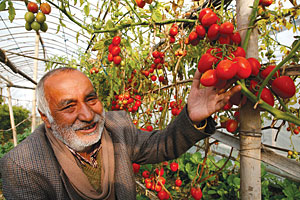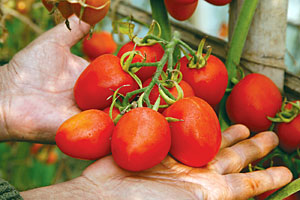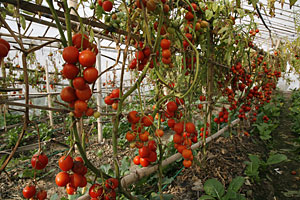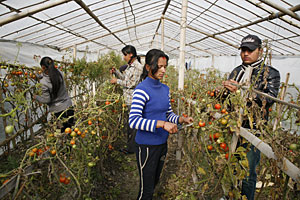 MIN RATNA BAJRACHARYA |
Nepal was once self-sufficient in food. A rising population and neglected agriculture mean that the country now imports most of its food from India.
But a small farm in a quiet suburb of Patan is cashing in on the huge demand for organic vegetables from the Indian states of Uttar Pradesh and Bihar. A locally developed variety of high-yield, wilt-resistant organic tomatoes called 'Shrijana' is one of the best-selling items.
Shrijana was developed over six years of research by a team led by Dr Kedar Budhathoki, a senior horticulturist at NARC (National Agricultural Research Council). He understood the tomato's potential, and after retirement set up a farm in Nakkhu to grow it in large-scale.
 |
Budhathoki's farm, spread over four acres, made Rs 2.5 million last year by exporting 60 tonnes of tomatoes to India, excluding seed sales priced at Rs 90,000 per kg in the Nepali market. Gorkha also exported tomato seeds to Bangladesh and Sikkim last year, and orders have come in from Saudi Arabia as well.
Spurred on by his own success, Budhathoki is promoting Shrijana to Nepali farmers. The company is supporting 50 farmers' groups in and around Kathmandu to grow Shrijana by providing free seeds, fertilisers and training on cultivation techniques.
 |
"The poor will always remain poor growing traditional crops. Farmers who have grown Shrijana on one ropani of land are earning Rs 124,000 every season. Moving to high-value crops is the only way to resolve the food crisis in Nepal," explains Budhathoki.
Retirement has not stopped Budhathoki from continuing with his research, and he recently launched nine varieties of heat-tolerant and disease-resistant tomatoes that can produce up to 30kg per plant.
 |
Budhathoki plans to train farmers to export vegetables to India. Nepal produces vegetables during the off-season in India, so it is an ideal situation. Farmers are being trained in grading and weighing techniques and marketing produce to Indian purchasers.
Says Budhathoki: "We have the right climate, right soil, and hard-working farmers. The market is right next door in India."
READ ALSO:
Company of dreams, PHILIP HOLMES
Turn on the meters, GREEN SCENE
Organic growth, SHRADHA BASNYAT


